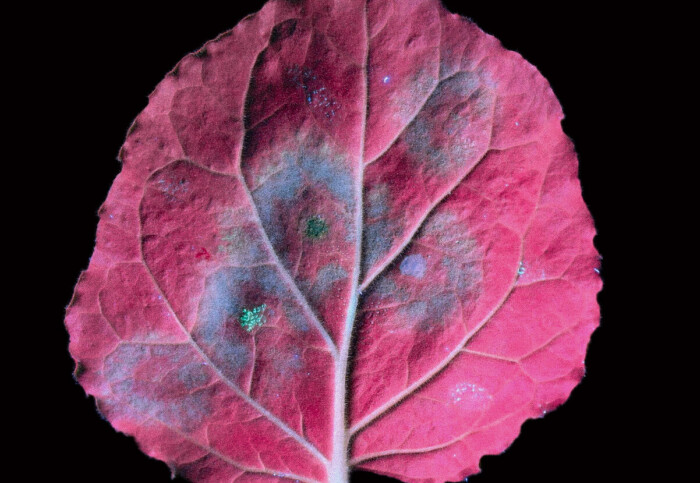Biometric data concerns and potato blight insights: News from Imperial

Infected plant leaf under UV. Credit: Dr Jiorgos Kourelis
Here’s a batch of fresh news and announcements from across Imperial.
From a report on biometric data collection to the invasion tactics of the potato blight pathogen, here is some quick-read news from across Imperial.
Biometric data risks
PhD student Vincent Saverat co-authored a new parliamentary briefing note on the potential risks associated with biometric data collection, published by the Parliamentary Office of Science and Technology (POST).
 Biometric data – such as fingerprints, facial recognition, and voiceprints – are increasingly used for security and identification purposes. The briefing outlines advancements in AI-driven biometric tools, which can now predict demographic traits and even attempt to infer emotional states.
Biometric data – such as fingerprints, facial recognition, and voiceprints – are increasingly used for security and identification purposes. The briefing outlines advancements in AI-driven biometric tools, which can now predict demographic traits and even attempt to infer emotional states.
Saverat, who is completing his PhD in Chemical Biology, collaborated with Dr Simon Brawley from POST to highlight concerns about privacy, data protection, and the risk of bias in the use of biometric technologies. Notably, facial recognition systems were found to be more prone to errors when identifying individuals from minority ethnic groups and underrepresented demographics.
The POST briefing serves as a critical resource for UK policymakers as they consider future legislation, including the upcoming Digital Information and Smart Data Bill.
Saverat said: “Writing this paper alongside the Parliamentary Office of Science and Technology has given me the unique opportunity to provide Members of Parliament with clear and impartial evidence on this quickly developing subject,”
Helping patients back to work
Bringing specialist Job Centre staff into GP clinics can help support patients with long-term sickness or disability to regain employment.
 In a small study, researchers from Imperial’s School of Public Health interviewed work coaches and disability employment advisors (DEAs) from Job Centres working in GP practices, as well as GPs who referred patients to these in-house services.
In a small study, researchers from Imperial’s School of Public Health interviewed work coaches and disability employment advisors (DEAs) from Job Centres working in GP practices, as well as GPs who referred patients to these in-house services.
All groups highlighted the benefits of services embedded in GP clinics, saying it provided a safe and accessible setting for patients to discuss barriers to employment, provided a bridge between healthcare and employment support, reduced GP workload, and could ultimately help patients get back into employment.
However, the researchers highlight the need to explore patient perspectives directly to fully assess how these services are integrated and identify any additional benefits or challenges to embedding careers services in GP clinics.
Dr Shriti Pattani, honorary senior lecturer at Imperial and one of the study’s authors, said:
“By providing careers services in a safe and accessible setting, it has the potential to support the employment aspirations of people, get people back into work, and could ultimately contribute to a more equitable and inclusive society.”
Read the full paper in Public Health in Practice.
Fleming Centre designers shortlist
The Royal Institute of British Architects (RIBA) has announced the shortlisted architect practices for The Fleming Centre competition at St Mary’s Hospital in Paddington: AHMM, Allies and Morrison, Grimshaw, Stanton Williams, and Wilkinson Eyre and White Arkitekter.

The Fleming Centre, which is due to open at St Mary’s Hospital in 2028, will be at the heart of the global Fleming Initiative, an innovative and collaborative approach led by Imperial College London and Imperial College Healthcare NHS Trust, with HRH Prince of Wales as its Patron, which aims to tackle anti-microbial resistance (AMR).
Last week the Initiative announced it had raised an initial £100m, supported by three new partners, LifeArc, Cepheid and Optum, alongside founding partner, GSK, and other philanthropists.
Professor Lord Ara Darzi, Executive Chair of the Fleming Initiative, said: "Science alone will not solve the global threat of antimicrobial resistance, we have to change human behaviour.
“The Fleming Centre is an embodiment of our commitment to making public engagement and behavioural science the cornerstones of the innovative solutions we need.
“I look forward to reviewing plans for the Fleming Centre that will make this vision a reality."
Blood cancer grant
Researchers are to investigate why patients treated with chemotherapy for blood cancers sometimes continue to suffer very low blood counts after the disease is treated.

Professor Cristina Lo Celso and PhD student Dr Germaine Chia were awarded £40000 in funding from Leukaemia and Myeloma Research UK for a two-year project aiming to increase the efficiency and reduce toxicity of chemotherapy treatment for blood cancers.
They believe that the bone marrow microenvironment plays a key role in blood count recovery after chemotherapy by supporting blood stem cells, and the grant will enable further investigation of this.
Poor blood count recovery after treatment has been linked to poorer survival rates among patients and even relapse.
They are also keen to hear from volunteers interested in helping to develop their team’s research - you can register on their website.
Potato blight insights
Imperial researchers led a team that have revealed how the pathogen behind the Irish potato famine hacks the plant immune system in order to invade. They found that the pathogen secretes a protein that manipulates a plant protein called TOPGAP, which normally regulates the trafficking of defence-related components within plant cells.
 The pathogen exploits this protein by pushing it into overdrive. This diverts crucial immune components away from where the pathogen is trying to enter, allowing it to establish a secure foothold within the plant.
The pathogen exploits this protein by pushing it into overdrive. This diverts crucial immune components away from where the pathogen is trying to enter, allowing it to establish a secure foothold within the plant.
First author Dr Enoch Lok Him Yuen, from the Department of Life Sciences, said: “By understanding this process, we can explore new strategies for developing crops with enhanced resistance, such as genetically improving plants to prevent immune suppression by pathogens. This contributes to food security by reducing crop losses and improving agricultural practices.”
Read the full paper in Science Advances.
---

Want to be kept up to date on news at Imperial?
Sign up for our free quick-read daily e-newsletter, Imperial Today.
Article text (excluding photos or graphics) © Imperial College London.
Photos and graphics subject to third party copyright used with permission or © Imperial College London.
Reporter
Hayley Dunning
Communications Division
Ryan O'Hare
Communications Division
Samantha Rey
Communications Division
Jacklin Kwan
Faculty of Natural Sciences